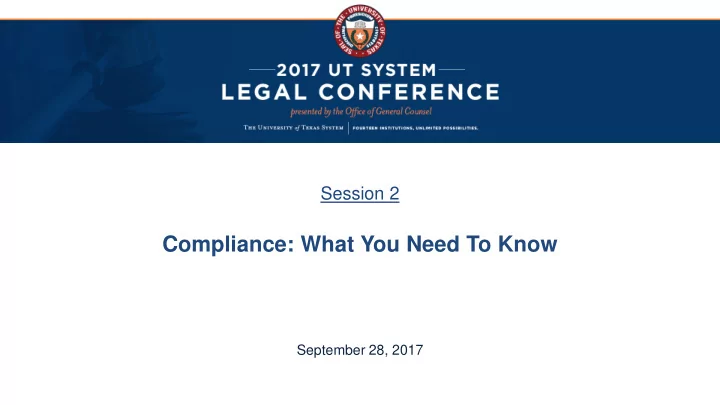

Session 2 Compliance: What You Need To Know September 28, 2017
Arthur Culpepper Trey Atchley Executive Director and Chief Inquiry Officer Deputy Compliance Officer Cristina Blanton Jason King Associate Systemwide Compliance Associate Systemwide Compliance Officer and Privacy Officer Officer and Ethics Officer 2
UT Systemwide Triage Team
Composition • Trey Atchley: Chief Inquiry Officer • David Givens: Systemwide Compliance • Alan Marks: Academic and Health Affairs • Tamra English: Office of General Counsel • Dyan Hudson: Audit 4
Investigative Functions 1. RECEIVE and ASSESS complaints. • Complaint hotline (anonymity and confidentiality) • BOR, Chancellor, OGC, HR, Audit, Compliance and Institutions 2. REFER complaints to the appropriate Institution for handling. 3. INVESTIGATE complaints arising within System Administration or referred by Institutions due to Executive Management conflict of interest. • Investigative composition: Two investigators and an OGC Attorney. 5
Predication (Evidence Sufficiency) • Assessment: Does the complaint contain sufficient information to support the initiation of a formal investigation, dismissal, or require further inquiry prior to initiating a full investigation? • Determining Factors – Seriousness of the alleged misconduct. – Is the Respondent an Executive Manager or Director? (conflict of interest) 6
Predication (cont.) (Evidence Sufficiency) • Determining Factors (cont.) – Analysis of initial complaint: • Anonymous or known Complainant. • Can allegations be independently verified through other witnesses or non-testimonial sources? • Is exculpatory evidence known or easily ascertainable? 7
Coordination • Initiate executive level notifications via appropriate Triage Member. – Academic, Health, Legal, Compliance, Audit, HR – Notification without compromising the integrity, objectivity, neutrality, and efficacy of the investigative process . • Track incidents via SharePoint and ensure visibility to BOR Legal and Chancellor Executive Director. 8
Questions 9
Recommend
More recommend